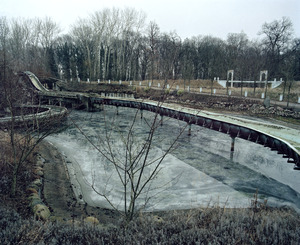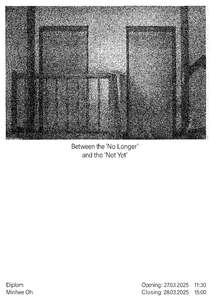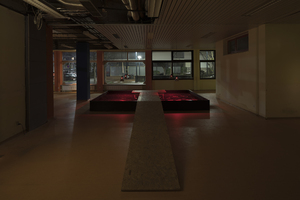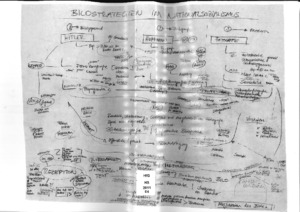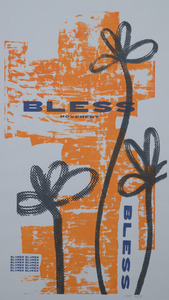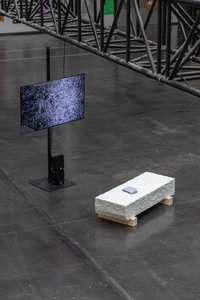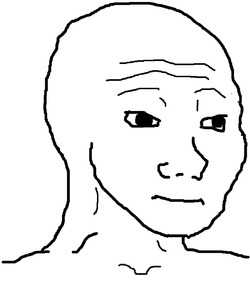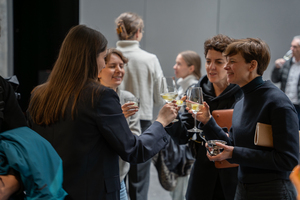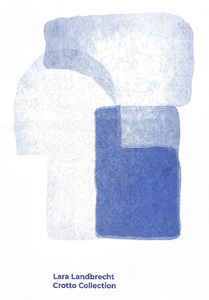She and her, white and white
Benachbarte Sets (121)Alle Zusammenhänge anzeigen
Diese Sets wurden den gleichen Sets hinzugefügt wie das ausgewählte Set.
121 Inhalte
- Seite 1 von 11
Berge versetzen
- Titel
- Berge versetzen
- Titel (en)
- Moving mountains
- Autor/in
- Beschreibung (de)
- Bei den ausgestellten Arbeiten handelt es sich ausschließlich um Arbeiten neueren Datums. Bis auf die Arbeit „Treptow“ aus dem Jahr 2002 sind alle Arbeiten in den letzten 10 Monaten entstanden.
In meinen Arbeiten setze ich mich mit dem „Modellieren von Landschaft“ auseinander. Die Skulpturalität oder auch die Landschaftsmodellierung bilden den Mittelpunkt meiner Arbeiten. Die Form und deren illusionistisches Spiel treten dabei immer mehr in den Vordergrund. Ungewöhnliche Blickwinkel lassen den Standpunkt des Betrachters unklar und schaffen eine Unsicherheit über das Abgebildete. Durch eine bestimmte Art der Abbildung der Landschaftsskulpturen verlieren sie ihre ursprüngliche Bedeutung und zeigen oftmals die Absurdität der Handlungsweise des Menschen.
Alle Bilder sind in einem analogen Aufnahmeverfahren mit einer Großbildkamera entstanden. Nur unwesentliche digitale Eingriffe sind nötig, um dem abgebildeten Bildcharakter zu verleihen. Das bewusste Aufsuchen von ungewöhnlichen Orten und Blickwinkeln lässt oftmals die Vermutung einer digitalen Montage zu. „Berge versetzen“ ist eine Metapher sowohl für den plastischen als auch den skulpturalen Umgang mit Landschaft. Das Wegnehmen und Hinzufügen ganzer Berge oder Bergteile stehen stellvertretend für die Mächtigkeit des Eingriffs des Menschen in die Natur.
- Bei den ausgestellten Arbeiten handelt es sich ausschließlich um Arbeiten neueren Datums. Bis auf die Arbeit „Treptow“ aus dem Jahr 2002 sind alle Arbeiten in den letzten 10 Monaten entstanden.
- Beschreibung (en)
- The exhibited works are all recent. With the exception of the work “Treptow” from 2002, all the works were created in the last 10 months.
In my works I deal with the “modeling of landscape”. Sculpturality or landscape modeling is the focus of my work. The form and its illusionistic play increasingly come to the fore. Unusual perspectives leave the viewer's point of view unclear and create uncertainty about what is depicted. By depicting the landscape sculptures in a certain way, they lose their original meaning and often show the absurdity of human behavior.
All of the pictures were taken using analog photography with a large-format camera. Only insignificant digital interventions are necessary to lend the depicted image character. The deliberate search for unusual locations and angles often leads to the assumption of a digital montage. “Moving mountains” is a metaphor for both the plastic and sculptural treatment of landscape. The removal and addition of entire mountains or parts of mountains are representative of the power of human intervention in nature.
- The exhibited works are all recent. With the exception of the work “Treptow” from 2002, all the works were created in the last 10 months.
- Kategorie
- Schlagworte
- Technik/Verfahren/Formate
- Großbildkamera
- Internetlinks
- Titel
- Berge versetzen
- Projektleiter/in
- Semester
- Studiengang
- Typ der Abschlussarbeit
- Importiert am
- 08.11.2024
- Übergeordnete Sets
- 2
- Set enthält
- 0 6
Between the 'No Longer' and the 'Not Yet'
- Titel
- Between the 'No Longer' and the 'Not Yet'
- Autor/in
- Beschreibung (de)
- Der Titel dieser Ausstellung, "Between the 'No Longer' and the 'Not Yet'", stammt aus den Schriften von Victor Turner über Liminalität. Turner beschreibt Liminalität als einen Übergangszustand – einen Moment, in dem man eine frühere Rolle oder einen früheren Status verlassen hat aber noch nicht vollständig in eine neue Position eingetreten ist. Es ist ein Zustand der Ungewissheit und Transformation. Vertraute Strukturen lösen sich auf und lassen einen in einer undefinierten und instabilen Lage zurück.
Dieses Konzept spiegelt meine Erfahrung als Ausländerin in Deutschland wider. Ich habe Korea verlassen, befinde mich aber noch immer in einem Schwebezustand, ohne mich vollständig angekommen zu fühlen. Um diesen Zustand des Dazwischen auszudrücken, habe ich Flure als visuelle Metapher verwendet. Beim leisen Umherwandern durch diese Flure, beim Fotografieren aus der Distanz, bin ich mir selbst begegnet.
Aus dem fotografischen Projekt entwickelte sich die Videoarbeit "The Act of Cleaning" (2025), die gemeinsam mit den Fotografien gezeigt wird. Inspiriert von Mary Douglas' Ideen zu Reinigungsritualen – bei denen das Säubern Ordnung in das Chaos bringt –, habe ich das Putzen zu meinem eigenen Ritual gemacht. Douglas argumentiert, dass Gesellschaften Ordnung schaffen, indem sie Dinge in klare Kategorien einteilen. Doch Wesen oder Konzepte, die sich diesen Kategorien entziehen – wie Migrant*innen, Hybride oder diejenigen in Übergangszuständen –, werden oft als störend empfunden. In diesem Kontext wurde das Reinigen zu einem Weg, mit der Spannung des Dazwischenseins umzugehen.
Mit bloßen Händen wischte ich jede Stufe der Treppen ab, durch die ich mich bewegte. Die Reibung zwischen Lappen und Boden, das Geräusch des ausgewrungenen Wassers und das Echo meiner Schritte füllten den Flur. Der Boden wurde vollkommen durchnässt – die Grenze zwischen Reinigen und Verschmutzen verschwamm. Diese repetitive, beinahe meditative Handlung veränderte meine Beziehung zu diesen Räumen. Das Putzen wurde mehr als eine praktische Geste – es wurde zu einem Akt, meine Präsenz zu behaupten und sie zugleich zu hinterfragen.
Wie kann ich hier existieren?
- Der Titel dieser Ausstellung, "Between the 'No Longer' and the 'Not Yet'", stammt aus den Schriften von Victor Turner über Liminalität. Turner beschreibt Liminalität als einen Übergangszustand – einen Moment, in dem man eine frühere Rolle oder einen früheren Status verlassen hat aber noch nicht vollständig in eine neue Position eingetreten ist. Es ist ein Zustand der Ungewissheit und Transformation. Vertraute Strukturen lösen sich auf und lassen einen in einer undefinierten und instabilen Lage zurück.
- Beschreibung (en)
- The title of this exhibition, "Between the 'No Longer' and the 'Not Yet'", comes from Victor Turner's writings on liminality. Turner describes liminality as a transitional state—when one has left behind a previous role or status but has not yet fully entered a new one. It is a state of ambiguity and transformation. Familiar structures dissolve, leaving one in an undefined and unstable position.
This concept reflects my experience as a foreigner in Germany. I left Korea, yet I find myself lingering in a liminal state, not fully settled. To convey this in-between state, I used hallways as a visual metaphor. Wandering through hallways quietly, photographing them from a distance, I came face to face with myself.
This photographic project developed into the video work, "The Act of Cleaning" (2025), which is presented alongside the photographs. Inspired by Mary Douglas's ideas on purification rituals—where cleaning imposes order on chaos—I chose cleaning as my own ritual. Douglas argues that societies create order by classifying things into clear categories. Yet, beings or concepts that defy these categories—such as migrants, hybrids, or those in transitional states—are often seen as unsettling. In this context, cleaning became a way to navigate the tension of existing in ambiguity.
Using my bare hands, I wiped down each step of the staircases I walked through. The friction between the rag and the floor, the sound of squeezing water, and the echo of my footsteps filled the hallway. The floor became completely soaked, blurring the boundary between cleaning and staining. This repetitive, almost meditative act transformed my relationship with these spaces. Cleaning became more than a practical gesture—it was a way to assert my presence while simultaneously questioning it.
In what ways can I exist here?
- The title of this exhibition, "Between the 'No Longer' and the 'Not Yet'", comes from Victor Turner's writings on liminality. Turner describes liminality as a transitional state—when one has left behind a previous role or status but has not yet fully entered a new one. It is a state of ambiguity and transformation. Familiar structures dissolve, leaving one in an undefined and unstable position.
- Kategorie
- Typ des Projekts/Werks
- Schlagworte
- Datierung
- 29.05.2025
- Mitwirkende
- Dank an
- Ort: Institution
- Ort
- Lichthof
- Stadt
- Land
- Titel
- Between the 'No Longer' and the 'Not Yet'
- Projektleiter/in
- Semester
- Studiengang
- Typ der Abschlussarbeit
- Importiert am
- 29.05.2025
- Übergeordnete Sets
- 2
- Set enthält
- 0 9
Bildkompost
- Titel
- Bildkompost
- Autor/in
- Beschreibung (de)
- Über einen Zeitraum von vier Wochen führte Ulf Beck in einer Versuchsanordnung Fotografien aus der Tagespresse einem Kompost mit Kompostwürmern zu. Ausgehend von der Untersuchung, welche Schlagzeilen es auf die erste Seite schaffen sowie deren fotografischer Darstellung, beschäftigte er sich mit dem Nachleben dieser Bilder. Dafür schnitt er jeden Tag die Abbildungen der Titelseite dreier großer Tageszeitungen aus und legte sie in einem Raster auf ein Becken mit Komposterde.
Das fotografische Bild wird als Teil des Medienorganismus durch die Verdauung der Würmer und verschiedener Mikroorganismen innerhalb von ca. 15 Tagen in den Erdorganismus überführt. Der Transformationsprozess ist am Ende nicht mehr sichtbar. Das Bild verliert seine Form und wird zu wertvollem Humus, welcher als Ansammlung von Millionen von Mikrobildern betrachtet werden kann.
- Über einen Zeitraum von vier Wochen führte Ulf Beck in einer Versuchsanordnung Fotografien aus der Tagespresse einem Kompost mit Kompostwürmern zu. Ausgehend von der Untersuchung, welche Schlagzeilen es auf die erste Seite schaffen sowie deren fotografischer Darstellung, beschäftigte er sich mit dem Nachleben dieser Bilder. Dafür schnitt er jeden Tag die Abbildungen der Titelseite dreier großer Tageszeitungen aus und legte sie in einem Raster auf ein Becken mit Komposterde.
- Beschreibung (en)
- Over a period of four weeks, Ulf Beck experimented with composting, using photographs from the daily press with compost worms. Based on the investigation of which headlines make it to the first page and their photographic representation, he deals with the afterlife of these images. For this, every day he cut out the illustrations of the front page of three large daily newspapers and put them in a grid on a basin with compost soil.
The photographic image is transferred as part of the media organism through the digestion of worms and various microorganisms into the earth organism, in around 15 days. The transformation process is no longer visible at the end. The image loses its form and becomes valuable humus, which can be regarded as an accumulation of millions of micro-images.
- Over a period of four weeks, Ulf Beck experimented with composting, using photographs from the daily press with compost worms. Based on the investigation of which headlines make it to the first page and their photographic representation, he deals with the afterlife of these images. For this, every day he cut out the illustrations of the front page of three large daily newspapers and put them in a grid on a basin with compost soil.
- Kategorie
- Typ des Projekts/Werks
- Schlagworte
- Datierung
- 07.12.2017 - 10.12.2017
- Material
- Abmessungen
- variable Maße
- Ort
- Markgrafenstraße 25, 76131 Karlsruhe
- Stadt
- Land
- Beteiligte Institution(en)
- Bemerkungen
- Die Arbeit war - in veränderter Form - am 27. & 28.01.2018 im Rahmen von Plat(t)form 2018, dem zwölften kuratierten internationalen Portfolio-Viewing für junge Künstler aus Europa, im renommierten Fotomuseum Winterthur (CH) zu sehen.
- Titel
- Bildkompost
- Projektleiter/in
- Semester
- Studiengang
- Typ der Abschlussarbeit
- Importiert am
- 05.03.2024
- Übergeordnete Sets
- 2
- Set enthält
- 0 11
Bildstrategien: eine Betrachtung des von Heinrich Hoffmann herausgegebenen Bildbandes "Hitler wie ihn keiner kennt."
- Titel
- Bildstrategien: eine Betrachtung des von Heinrich Hoffmann herausgegebenen Bildbandes "Hitler wie ihn keiner kennt."
- Autor/in
- Beschreibung (de)
- „Rudolf Herz hat mit seiner Ausstellung im Fotomuseum im Münchner Stadtmuseum und der gleichnamigen Publikation „Hoffmann und Hitler – Fotografie als Medium des Führer-Mythos“ 1994 einen wichtigen Grundstein für die Forschung um Heinrich Hoffmann, Adolf Hitler und die fotografische Führerpropaganda gelegt. Herz führt in seiner Darlegung in gewisser Weise eine Genealogie des „Hitlerbildes“ aus, das durch die Fotografie Hoffmanns seinen Ausdruck fand: Beginnend mit frühen fotografischen Portraitstudien, die von Heinrich Hoffmann als Postkarten vertrieben wurden, eröffnet der Medienforscher Herz in seinem Buch ein Panorama, das nicht nur die Herausformung der Figur Hitler zeigt, sondern auch die darauf folgenden Bildgattungen, in denen Hitler als Mensch vermarktet wurde.”
„Dieser Band ist nicht der erste Versuch, Adolf Hitler als Bildkonstante in die Gesellschaft einzuführen. Allerdings ist es der erste erfolgreiche Bildband, der es schafft, nicht nur von Hitler zu erzählen, sondern ihn mittels geschickt arrangierter Bildfolge zugleich als Führer und als natürlichen Menschen erscheinen zu lassen. In welchem Zeitraum des Jahres 1932 genau der Bildband „Hitler wie ihn keiner kennt“ erschienen ist, kann mittels der heute noch vorliegenden Bände nicht mehr rekonstruiert werden. Es ist vor allem der Rückgriff auf den Kontext, der in der analytischen Betrachtung und Einordnung des Bandes helfen muss. Das Medium Fotografie wird hier ein zweites Mal wirksam, jedoch nicht immanent (narrativ), sondern aus historischer Perspektive: eine Perspektive, die an dieser Stelle trotz propagandistischer Bildkonzeption auch dokumentarisch Auskunft geben kann.”
- „Rudolf Herz hat mit seiner Ausstellung im Fotomuseum im Münchner Stadtmuseum und der gleichnamigen Publikation „Hoffmann und Hitler – Fotografie als Medium des Führer-Mythos“ 1994 einen wichtigen Grundstein für die Forschung um Heinrich Hoffmann, Adolf Hitler und die fotografische Führerpropaganda gelegt. Herz führt in seiner Darlegung in gewisser Weise eine Genealogie des „Hitlerbildes“ aus, das durch die Fotografie Hoffmanns seinen Ausdruck fand: Beginnend mit frühen fotografischen Portraitstudien, die von Heinrich Hoffmann als Postkarten vertrieben wurden, eröffnet der Medienforscher Herz in seinem Buch ein Panorama, das nicht nur die Herausformung der Figur Hitler zeigt, sondern auch die darauf folgenden Bildgattungen, in denen Hitler als Mensch vermarktet wurde.”
- Beschreibung (en)
- ‘With his exhibition at the Fotomuseum in Munich's Stadtmuseum and the publication of the same name ‘Hoffmann and Hitler - Photography as a Medium of the Führer Myth’ in 1994, Rudolf Herz laid an important foundation stone for research into Heinrich Hoffmann, Adolf Hitler and photographic Führer propaganda. In his account, Herz sets out a kind of genealogy of the ‘Hitler image’, which found its expression through Hoffmann's photography: Beginning with early photographic portrait studies that were distributed by Heinrich Hoffmann as postcards, media researcher Herz opens up a panorama in his book that shows not only the moulding of the figure of Hitler, but also the subsequent image genres in which Hitler was marketed as a human being.’
‘This volume is not the first attempt to introduce Adolf Hitler into society as an image constant. However, it is the first successful illustrated book that manages not only to tell the story of Hitler, but also to make him appear both as a leader and as a natural human being by means of a skilfully arranged sequence of images. It is no longer possible to reconstruct exactly when the illustrated book ‘Hitler wie ihn keiner kennt’ was published in 1932 using the volumes still available today. It is above all the recourse to the context that must help in the analytical consideration and categorisation of the volume. The medium of photography becomes effective a second time here, but not immanently (narratively), but from a historical perspective: a perspective that can also provide documentary information at this point, despite the propagandistic image concept.’
- ‘With his exhibition at the Fotomuseum in Munich's Stadtmuseum and the publication of the same name ‘Hoffmann and Hitler - Photography as a Medium of the Führer Myth’ in 1994, Rudolf Herz laid an important foundation stone for research into Heinrich Hoffmann, Adolf Hitler and photographic Führer propaganda. In his account, Herz sets out a kind of genealogy of the ‘Hitler image’, which found its expression through Hoffmann's photography: Beginning with early photographic portrait studies that were distributed by Heinrich Hoffmann as postcards, media researcher Herz opens up a panorama in his book that shows not only the moulding of the figure of Hitler, but also the subsequent image genres in which Hitler was marketed as a human being.’
- Kategorie
- Typ des Projekts/Werks
- Schlagworte
- Datierung
- 01.03.2011
- Sprache
- Ort: Institution
- Titel
- Bildstrategien: eine Betrachtung des von Heinrich Hoffmann herausgegebenen Bildbandes "Hitler wie ihn keiner kennt."
- Projektleiter/in
- Semester
- Studiengang
- Typ der Abschlussarbeit
- Archiv-Signatur
- HfG HS 2011 04
- Externes Archiv
- Importiert am
- 03.04.2025
- Übergeordnete Sets
- 2
- Set enthält
- 0 3
Bio Design Lab
- Titel
- Bio Design Lab
- Beschreibung (de)
- Das Bio Design Lab ist ein hybrider und evolutiver Ort, der sowohl im digitalen als auch im physischen Raum existiert. Konzipiert als wachsende Plattform, die die Fachbereiche der Staatlichen Hochschule für Gestaltung miteinander verbindet, wird das Labor als Raum für Präsentation, Bildung und Wissensvermittlung genutzt.
Das Bio Design Lab konzentriert sich auf die lokale Region, ihre Ressourcen und Möglichkeiten und zielt aktiv darauf ab, die Produktionsweisen in Karlsruhe und Süddeutschland umzugestalten und neu zu überdenken. Zur Interaktion mit diesen Themen und Materialien, sowohl im digitalen als auch im physischen Raum, lädt das Labor lokale ExpertInnen und BesucherInnen gleichermaßen ein an gemeinsamen Projekten zu arbeiten.
Spuren dieser Aktivitäten komplementieren ein ständig wachsenden Netzwerk.Das Wissen über diese Ressourcen wird durch die Erstellung eines Know-how-Glossars und einer Materialbibliothek destilliert, durch virtuelle und physische Workshops vermittelt, sowie durch die Präsentationen herausragender Projekte, die sich mit nachhaltigen Materialien befassen, kommuniziert.
Das Labor fungiert als Inkubator und Modell für Zusammenarbeit und Produktion, das im Einklang mit dem aktuellen Wandel der Staatlichen Hochschule für Gestaltung Karlsruhe steht.
- Das Bio Design Lab ist ein hybrider und evolutiver Ort, der sowohl im digitalen als auch im physischen Raum existiert. Konzipiert als wachsende Plattform, die die Fachbereiche der Staatlichen Hochschule für Gestaltung miteinander verbindet, wird das Labor als Raum für Präsentation, Bildung und Wissensvermittlung genutzt.
- Beschreibung (en)
- The Bio Design Lab is a hybrid and evolutive environment that exists in both the digital and physical space. Conceived as a platform for connection and collaboration with local partners and using local resources, the Lab hosts the presentation, education and transmission of knowledge. As students and experts are invited to work on bio-design related projects, visitors can explore and interact with the Lab’s production and lines of inquiry.
Projects within the Lab focus on the local region, its materials and possibilities, and actively aim to reshuffle and rethink modes of production in Karlsruhe and the south of Germany. Topics under exploration include Algae, Soil, Plants, Body, and Agriculture. To interact with these themes and related materials, both within the digital and physical space, the Lab invites local experts and visitors alike.
Within the Bio Design Lab, regional resources are collected by connecting with local partners; they are then distilled through the making of a know-how glossary and a material library, aiming to develop local materials. The knowledge around these resources is disseminated through virtual workshops and multimedia presentations of outstanding projects dealing with sustainable materials. Ultimately, traces of these activities will remain in a constantly growing network, both in the digital platform and in physical displays of existing and future objects.
The Lab works as an incubator and a model for collaboration and production that is in line with the current transformation of the Karlsruhe University of the Arts and Design Karlsruhe. It was first presented to the public in the context of Critical Zones, an exhibition at ZKM | Center for Art and Media.
- The Bio Design Lab is a hybrid and evolutive environment that exists in both the digital and physical space. Conceived as a platform for connection and collaboration with local partners and using local resources, the Lab hosts the presentation, education and transmission of knowledge. As students and experts are invited to work on bio-design related projects, visitors can explore and interact with the Lab’s production and lines of inquiry.
- Schlagworte
- Ort: Institution
- Ort
- Bio Design Lab
- Stadt
- Land
- Internetlinks
- Titel
- Bio Design Lab
- Projektleiter/in
- Importiert am
- 23.10.2023
- Übergeordnete Sets
- 0
- Set enthält
- 5 2
Blast or Bless 2024/2025
- Titel
- Blast or Bless 2024/2025
- Titel (en)
- Blast or Bless 2024/2025
- Untertitel
- Eine Einführung in den Siebdruck
- Untertitel des Projekts/Werks (en)
- An introduction into screen printing
- Beschreibung (de)
- Inspiriert vom Manifest des Vortizismus "Blast!" kreieren Studierende ein experimentelles, grafisches Poster als Teil des Siebdruck-Grundlagenkurses an der HfG. Während des viertägigen Kurses, der die praktischen und theoretischen Grundlagen der Druckvorstufe und des Siebdruckes an die Studierenden vermittelt, lernen Studierende über die historische und kunstgeschichtliche Entwicklung des Druckverfahrens und wie sie mit Ölkreide und Papierschablonen erste, experimentelle Siebe mit kleinem Budget herstellen können. Des Weiteren erfahren Studierende, wie sie ihre Motive und die Siebe vorbereiten, um sie fotografisch zu entwickeln, wie sie mit wasserbasierten Farben umgehen, die Drucktische einrichten, um die unterschiedlichen Ebenen ihres mehrfarbigen Posters zu registrieren und wie sie die Siebdruckrahmen im Anschluss entschichten.
- Beschreibung (en)
- Inspired by the "Blast!" Manifestos of Vorticism, students create an experimental, graphic poster as part of the screen printing foundation course at the HfG. During the four-day course, which teaches students the practical and theoretical basics of prepress and screen printing, students learn about the historical and art-historical development of the printing process and how they can use oil pastels and paper stencils to produce their first experimental screens on a small budget. Furthermore, students learn how to prepare their motifs and the screens in order to develop them photographically, how to deal with water-based inks, how to set up the printing tables to register the different levels of their multicoloured poster and how to decoat the screen printing frame.
- Kategorie
- Typ des Projekts/Werks
- Schlagworte
- Datierung
- 01.10.2024 - 01.08.2025
- Mitwirkende
- Titel
- Blast or Bless 2024/2025
- Projektleiter/in
- Semester
- Studiengang
- Importiert am
- 15.07.2025
- Übergeordnete Sets
- 1
- Set enthält
- 0 31
block to blob
- Titel
- block to blob
- Titel (en)
- block to blob
- Untertitel
- tracing back materiality
- Untertitel des Projekts/Werks (en)
- tracing back materiality
- Autor/in
- Beschreibung (de)
- Dieses Diplomprojekt dokumentiert den Materialstrom von synthetischen Kunststoffen durch einen rückwärtsgerichteten chronologischen Ansatz. Es kombiniert Feldforschung, visuelle Dokumentation und Materialexperimente, um die Reise von Kunststoffen von ihren Endprodukten zurück zu ihrem Ursprung im Erdöl nachzuvollziehen.
"Block to Blob" umfasst Besuche an verschiedenen Orten der Produktionskette, wie etwa Produktionsanlagen, Ölraffinerien, Pipelines und Förderstätten und endet in einem Waldökosystem, wo Rohöl auf natürliche Weise an die Erdoberfläche tritt. Diese Erfahrungen werden in einer Forschungspublikation zusammengestellt, die dieser rückwärtsgerichteten Erzählweise folgt.
Eine Videoinstallation dokumentiert die besuchten Orte und liefert einen visuellen Kontext zu den industriellen Prozessen, der verborgenen Infrastruktur und der natürlichen Substanz im Wald. Zusätzlich verankert eine Reihe von Objekten, die aus mit Erdöl beschichtetem Holz und Polystyrol gefertigt sind, das Projekt in greifbaren Materialien.
- Dieses Diplomprojekt dokumentiert den Materialstrom von synthetischen Kunststoffen durch einen rückwärtsgerichteten chronologischen Ansatz. Es kombiniert Feldforschung, visuelle Dokumentation und Materialexperimente, um die Reise von Kunststoffen von ihren Endprodukten zurück zu ihrem Ursprung im Erdöl nachzuvollziehen.
- Beschreibung (en)
- This diploma project details the material stream of synthetic plastics through a reverse chronological approach. It combines field research, visual documentation, and material experimentation to retrace the journey of plastics from their final products back to their origins in petroleum.
‘block to blob’ includes visits to various sites in the production chain, such as manufacturing facilities, oil refineries, pipelines, and extraction sites, concluding in a forest ecosystem, where crude oil naturally seeps to the earth's surface. These experiences are compiled into a research publication that follows this reverse narrative.
A video installation documents the visited locations, providing visual context for the industrial processes, hidden infrastructure and the natural substance in the forest. Additionally, a series of objects made from petroleum-coated wood and polystyrene grounds the project in tangible materials.
- This diploma project details the material stream of synthetic plastics through a reverse chronological approach. It combines field research, visual documentation, and material experimentation to retrace the journey of plastics from their final products back to their origins in petroleum.
- Kategorie
- Typ des Projekts/Werks
- Schlagworte
- Datierung
- 2024
- Sprache
- Untertitel (Film)
- Material
- Technik/Verfahren/Formate
- Pine wood coated with petroleum, Wood soaked in gasoline and pressed/bonded with polystyrene
- Abmessungen
- L x B x H mm, Petroleum-coated wooden objects: Bench: 800 x 200 x 450, 2x T-Stool: 350 x 200 x 450, Stool (3-legged): 450 x 270 x 450, Stool (wide): 600 x 450 x 450, TV stand: - Polystyrene Objekts: Counter: 500 x 370 x 1100, 2x Bench1: 1000 x 570 x 400, Bench2: 1300 x 570 x 350, Stool: 500 x 370 x 570
- Dauer
- 1.: upstream 0 - oil seeping naturally to the surface - Alsace - 2:55min, 2.: upstream 1 - prospect drilling for oil reservoirs - Weingarten - 2:17min, 3.: upstream 2 - horse head pumps extracting oil - Landau - 3:50min, 4.: midstream - transalpine pipeline - Triest-Karlsruhe - 10:40min, 5.: downstream 1 - germany biggest oil refinery - Karlsruhe - 3:13min, 6.: downstream 2 - world biggest chemical plant - Ludwigshafen - 2:19min
- Ort: Institution
- Ort
- Lichthof 3
- Stadt
- Land
- Titel
- block to blob
- Projektleiter/in
- Semester
- Studiengang
- Typ der Abschlussarbeit
- Lehrveranstaltung
- Importiert am
- 03.11.2024
- Übergeordnete Sets
- 3
- Set enthält
- 4 1
By Users for Users
- Titel
- By Users for Users
- Untertitel
- Memes als digitale Folklore
- Untertitel des Projekts/Werks (en)
- Memes as Digital Folklore
- Autor/in
- Beschreibung (de)
- Die vorliegende Abschlussarbeit „By Users for Users. Memes als digitale Folklore“ untersucht die kulturellen, technologischen und politischen Dimensionen von Internet-Memes als eine der zentralen Bildpraktiken der Gegenwart. Memes werden dabei nicht nur als humoristische Phänomene, sondern als Ausdruck einer globalen, partizipativen Bildkultur verstanden, die häufig auch als eine Form digitaler Folklore-Kultur beschrieben wird. Die Arbeit untersucht die Bedeutungsebenen dieser Begrifflichkeit und analysiert neben den technischen und ästhetischen Rahmenbedingungen von Memes ihre identitätsstiftende Funktion innerhalb digital vernetzter Gemeinschaften sowie ihre Verstrickungen mit plattformkapitalistischen Infrastrukturen. Ein besonderer Fokus liegt darauf, wie einzelne Memes, Communitys und Plattformen durch reaktionäre Akteur:innen angeeignet und instrumentalisiert werden.
Als Fallbeispiel dient der Arbeit das sog. Wojak-Meme, eine dilettantisch erstellte Computergrafik eines melancholischen Gesichts. Wojak illustriert nicht nur die für Memes charakteristische Amateurästhetik, sondern auch, wie Memes als ‚visuelle Dialekte‘ bestimmter Communitys funktionieren und hierbei sowohl Gemeinschaft stiften als auch ausschließen können. Speziell das Wojak-Meme und seine Variationen werden durch die neurechte Alt-Right sowie durch die misogyne Incel-Community verwendet, um unter dem Deckmantel von Ironie und Humor Ideologien und Feindbilder zu erzeugen und zu verbreiten.
Genau wie der Philosoph Antonio Gramsci die Relevanz von Folklore für den frühen italienischen Faschismus beschrieb, trägt auch digitale Folklore maßgeblich zur Konstitution von Weltbildern bei und ist dabei oft wirkmächtiger als offizielle Normen und Gesetze. Was einst als eine ‚Demokratisierung der Bildproduktion‘ beschrieben wurde, ist längst zu einer Gefahr für die Demokratie geworden. Abschließend plädiert die Arbeit deshalb für eine kritische Folkloristik des Digitalen, die die Bildwelten der Partizipationskultur interdisziplinär zwischen Kunst- und Medienwissenschaften analysiert, um so deren Bildcharakter sowie die Dynamiken digitaler Infrastrukturen zu reflektieren.
- Die vorliegende Abschlussarbeit „By Users for Users. Memes als digitale Folklore“ untersucht die kulturellen, technologischen und politischen Dimensionen von Internet-Memes als eine der zentralen Bildpraktiken der Gegenwart. Memes werden dabei nicht nur als humoristische Phänomene, sondern als Ausdruck einer globalen, partizipativen Bildkultur verstanden, die häufig auch als eine Form digitaler Folklore-Kultur beschrieben wird. Die Arbeit untersucht die Bedeutungsebenen dieser Begrifflichkeit und analysiert neben den technischen und ästhetischen Rahmenbedingungen von Memes ihre identitätsstiftende Funktion innerhalb digital vernetzter Gemeinschaften sowie ihre Verstrickungen mit plattformkapitalistischen Infrastrukturen. Ein besonderer Fokus liegt darauf, wie einzelne Memes, Communitys und Plattformen durch reaktionäre Akteur:innen angeeignet und instrumentalisiert werden.
- Beschreibung (en)
- The M.A. thesis "By Users for Users. Memes as Digital Folklore" examines the cultural, technological and political dimensions of Internet memes as one of the central image practices of the present day. Memes are understood not only as a humorous phenomenon, but also as an expression of a global, participatory image culture, which is often described as a form of digital folklore culture. The text examines the layers of meaning of this terminology and, in addition to the technological and aesthetic conditions of memes, analyzes their identity-forming function within digitally networked communities as well as their entanglements with platform capitalist infrastructures. A particular focus is on how individual memes, communities and platforms are appropriated and instrumentalized by reactionary actors.
The so-called Wojak meme, an amateurishly created computer graphic of a melancholy face, serves as a case study. Wojak illustrates not only the amateur aesthetics characteristic of memes, but also the function of memes as ‘visual dialects’ of certain communities which simultaneously include and exclude individuals. In particular, the Wojak meme and its variations are used by the reactionary alt-right and the misogynistic incel community to create and disseminate ideologies and enemy images under the guise of irony and humor.
Just as philosopher Antonio Gramsci described the relevance of folklore for early Italian fascism, digital folklore also contributes significantly to the constitution of world views and, often proving more powerful than official laws and values. What was once described as a ‘democratization of image production’ has long since become a threat to democracy. In its conclusion, the thesis therefore advocates for a critical folkloristics of the digital that analyzes the visual worlds of participatory culture in an interdisciplinary way between art history and media studies in order to reflect on their visual character and the dynamics of digital infrastructures.
- The M.A. thesis "By Users for Users. Memes as Digital Folklore" examines the cultural, technological and political dimensions of Internet memes as one of the central image practices of the present day. Memes are understood not only as a humorous phenomenon, but also as an expression of a global, participatory image culture, which is often described as a form of digital folklore culture. The text examines the layers of meaning of this terminology and, in addition to the technological and aesthetic conditions of memes, analyzes their identity-forming function within digitally networked communities as well as their entanglements with platform capitalist infrastructures. A particular focus is on how individual memes, communities and platforms are appropriated and instrumentalized by reactionary actors.
- Kategorie
- Typ des Projekts/Werks
- Schlagworte
- Datierung
- 05.02.2025
- Dank an
- Sprache
- Abmessungen
- 144 Seiten (109 Textseiten)
- Titel
- By Users for Users
- Projektleiter/in
- Semester
- Studiengang
- Typ der Abschlussarbeit
- Importiert am
- 25.06.2025
- Übergeordnete Sets
- 2
- Set enthält
- 0 8
ChitoTinkering
- Titel
- ChitoTinkering
- Titel (en)
- ChitoTinkering
- Untertitel
- neue perspektiven für chitosan
- Untertitel des Projekts/Werks (en)
- new perspectives for chitosan
- Autor/in
- Beschreibung (de)
- Im Rahmen ihres Materialforschungsprojekts entwickelten Benjamin Kaltenbach, Lilith Stumpf, Felix Harr und Julia Ihls innovative Anwendungen für Chitosan – ein vielseitiges Biopolymer, das aus Chitin gewonnen wird. Chitin ist nach Cellulose das zweithäufigste natürliche Polymer und bildet die strukturelle Basis für die Schalen von Krebstieren, die Exoskelette von Insekten sowie Zellwände bestimmter Pilze.
Inspiriert von der schützenden Funktion von Chitin in der Natur übertrugen die Designer*innen die Materialeigenschaften von Chitosan in einen alltagsnahen Kontext. Der Fokus lag dabei auf den Konzepten von Gehäusen und Hüllen – Anwendungen, die Schutz und Struktur vereinen. Das Ergebnis sind eine Reihe funktionaler Prototypen, darunter ein Lampenschirm, ein Stift, transparente Dokumentenhüllen sowie eine Dokumentenmappe, die aus dem Chitosan-Komposit gefertigt wurden.
Um die gestalterischen und technischen Möglichkeiten des Materials auszuloten, wurden unterschiedliche Bearbeitungstechniken erprobt: Das Chitosan-Material wurde genäht, genietet, gebügelt, gefaltet, selbstverklebt sowie mittels CNC-Laser graviert und geschnitten. Diese experimentelle Auseinandersetzung mit Verarbeitungstechniken hebt die gestalterische Vielseitigkeit von Chitosan hervor und zeigt sein Potenzial als nachhaltige Material Alternative auf.
Durch diese gestalterische und technische sowie konzeptuelle Auseinandersetzung eröffnen die Designer*innen neue Perspektiven für Chitosan und unterstreichen sein Potenzial als nachhaltige Material Alternative.
- Im Rahmen ihres Materialforschungsprojekts entwickelten Benjamin Kaltenbach, Lilith Stumpf, Felix Harr und Julia Ihls innovative Anwendungen für Chitosan – ein vielseitiges Biopolymer, das aus Chitin gewonnen wird. Chitin ist nach Cellulose das zweithäufigste natürliche Polymer und bildet die strukturelle Basis für die Schalen von Krebstieren, die Exoskelette von Insekten sowie Zellwände bestimmter Pilze.
- Beschreibung (en)
- As part of their material research project, Benjamin Kaltenbach, Lilith Stumpf, Felix Harr, and Julia Ihls developed innovative applications for chitosan – a versatile biopolymer derived from chitin. Chitin is the second most abundant natural polymer after cellulose and forms the structural basis of crustacean shells, insect exoskeletons, and the cell walls of certain fungi.
Inspired by chitin’s protective function in nature, the designers translated the material properties of chitosan into everyday applications. Their focus was on the concept of enclosures and casings – objects that combine protection and structure. The result is a series of functional prototypes, including a lampshade, a pen, transparent document sleeves, and a folder, all made from chitosan composite material.
To explore the material’s creative and technical potential, various processing techniques were tested: The chitosan material was sewn, riveted, ironed, folded, self-adhered, and engraved or cut using a CNC laser. This experimental approach highlights the versatility of chitosan and demonstrates its potential as a sustainable material alternative.
Through this design and technical exploration, the designers open up new perspectives for chitosan and emphasize its potential as an innovative, bio-based material.
- As part of their material research project, Benjamin Kaltenbach, Lilith Stumpf, Felix Harr, and Julia Ihls developed innovative applications for chitosan – a versatile biopolymer derived from chitin. Chitin is the second most abundant natural polymer after cellulose and forms the structural basis of crustacean shells, insect exoskeletons, and the cell walls of certain fungi.
- Kategorie
- Typ des Projekts/Werks
- Schlagworte
- Datierung
- Februar 2025
- Mitwirkende
- Dank an
- Material
- Ort: Institution
- Ort
- Unter dem Bio Design Lab
- Stadt
- Land
- Internetlinks
- Titel
- ChitoTinkering
- Importiert am
- 17.07.2025
- Übergeordnete Sets
- 1
- Set enthält
- 0 9
cool pieces
- Titel
- cool pieces
- Titel (en)
- cool pieces
- Untertitel
- a democratic cooling collection
- Autor/in
- Beschreibung (de)
- „cool pieces” beschäftigt sich mit den Auswirkungen des Klimawandels auf den menschlichen Körper und deren Hitzeanpassung. Mit einem Open-Source Gedanken präsentiert das Projekt ein Ensemble von drei tragbaren Objekten, deren Design vielfältige Facetten eines simplen Fächers aufgreift, welcher einer der zugänglichsten Methoden zur Kühlung des Körpers darstellt. Das Set umfasst einen Sonnenponcho, eine entfaltbare Kopfbedeckung sowie einen Handfächer, um eine wirksame Kühlung zu gewährleisten. Ein zentraler Gedanke bei der Entwicklung der Objekte war die Überwindung finanzieller Barrieren, um eine breite Teilhabe zu ermöglichen. Aus diesem Grund werden sämtliche Anleitungen zur unentgeltlichen Nutzung auf der Website zur Verfügung gestellt, um eine nahezu kostenfreie Herstellung zu gewährleisten. Besonderes Augenmerk wurde dabei auf die Verwendung handelsüblicher Nähmaschinen gelegt, da sie flächendeckend verfügbar sind und somit für eine breite Bevölkerungsschicht zugänglich ist.
- „cool pieces” beschäftigt sich mit den Auswirkungen des Klimawandels auf den menschlichen Körper und deren Hitzeanpassung. Mit einem Open-Source Gedanken präsentiert das Projekt ein Ensemble von drei tragbaren Objekten, deren Design vielfältige Facetten eines simplen Fächers aufgreift, welcher einer der zugänglichsten Methoden zur Kühlung des Körpers darstellt. Das Set umfasst einen Sonnenponcho, eine entfaltbare Kopfbedeckung sowie einen Handfächer, um eine wirksame Kühlung zu gewährleisten. Ein zentraler Gedanke bei der Entwicklung der Objekte war die Überwindung finanzieller Barrieren, um eine breite Teilhabe zu ermöglichen. Aus diesem Grund werden sämtliche Anleitungen zur unentgeltlichen Nutzung auf der Website zur Verfügung gestellt, um eine nahezu kostenfreie Herstellung zu gewährleisten. Besonderes Augenmerk wurde dabei auf die Verwendung handelsüblicher Nähmaschinen gelegt, da sie flächendeckend verfügbar sind und somit für eine breite Bevölkerungsschicht zugänglich ist.
- Beschreibung (en)
- ‘cool pieces’ deals with the effects of climate change on the human body and its adaptation to heat. With an open source mindset, the project presents an ensemble of three wearable objects whose design takes on multiple facets of a simple fan, one of the most accessible ways to cool the body. The set includes a sun poncho, a deployable headgear and a hand fan for effective cooling. A central idea in the development of the items was to overcome financial barriers to enable widespread participation. For this reason, all instructions are available for free on the website to ensure that production is virtually cost-free. Special attention was paid to the use of commercially available sewing machines, as they are widely available and therefore accessible to a wide range of people.
- ‘cool pieces’ deals with the effects of climate change on the human body and its adaptation to heat. With an open source mindset, the project presents an ensemble of three wearable objects whose design takes on multiple facets of a simple fan, one of the most accessible ways to cool the body. The set includes a sun poncho, a deployable headgear and a hand fan for effective cooling. A central idea in the development of the items was to overcome financial barriers to enable widespread participation. For this reason, all instructions are available for free on the website to ensure that production is virtually cost-free. Special attention was paid to the use of commercially available sewing machines, as they are widely available and therefore accessible to a wide range of people.
- Kategorie
- Schlagworte
- Datierung
- 14.12.2023
- Material
- Abmessungen
- Fächer (30x30cm), Poncho (45x100cm), Hut (Durchmesser 50cm)
- Internetlinks
- Bemerkungen
- Youtube Link zum Video der Performance:
https://www.youtube.com/watch?v=8HIEUG2vebg
- Youtube Link zum Video der Performance:
- Titel
- cool pieces
- Projektleiter/in
- Semester
- Studiengang
- Typ der Abschlussarbeit
- Importiert am
- 30.01.2024
- Übergeordnete Sets
- 3
- Set enthält
- 0 16
Crotto Collection
- Titel
- Crotto Collection
- Untertitel des Projekts/Werks (en)
- Translation of sanitary ceramics
- Autor/in
- Beschreibung (de)
- Das Projekt „Crotto Collection“ untersucht den Raum des Badezimmers von der funktionalen Nasszelle bis zum häuslichen Refugium. Trotz ihrer Vielfalt teilen Baderäume ein zentrales, funktionales Element: die Sanitärkeramik.
Das Projekt beschäftigt sich mit den Gestaltungsmöglichkeiten durch die Übersetzung gebrannter Sanitärkeramik in ein neues Material. In Zusammenarbeit mit der Firma Geberit GmbH wird die Zusammensetzung des Materialentwurfs untersucht, auf ihre Eigenschaften geprüft und ein Gestaltungskonzept für Badezimmeraccessoires entwickelt. Basierend auf den Forschungsergebnissen wird ein Konzept entwickelt, das als Ansatz dient, keramische Abfälle innerhalb der Produktionskette einer Industrie weiter zu verwerten. Parallel zu verschiedenen Fliesenformen wird ein Zubehörset bestehend aus Spiegelhalter, Becher und Seifenschale entworfen. Darüber hinaus werden Vasen aus Toilettenformen entwickelt, als Symbol für die Ausweitung des Badezimmers in andere Wohnräume.
- Das Projekt „Crotto Collection“ untersucht den Raum des Badezimmers von der funktionalen Nasszelle bis zum häuslichen Refugium. Trotz ihrer Vielfalt teilen Baderäume ein zentrales, funktionales Element: die Sanitärkeramik.
- Beschreibung (en)
- The project “Crotto Collection” examines the bathroom space from the functional wet room to the domestic refuge. Despite their variety, bathrooms all serve a common purpose. The central component of any bathroom is the sanitary ceramics.
This fact gives rise to the project, which deals with the design possibilities of translating fired sanitary ceramics into a new material. In collaboration with Geberit GmbH, material properties and usability are being investigated. Based on the research results, a design concept is developed that serves as an approach to translate ceramic waste within the production chain of an industry. Parallel to different shapes of tiles, an accessory set consisting of a mirror holder, a tumbler and a soap dish is created. In addition, vases are designed from toilet forms, as a symbol of extending the bathroom space into other living spaces.
- The project “Crotto Collection” examines the bathroom space from the functional wet room to the domestic refuge. Despite their variety, bathrooms all serve a common purpose. The central component of any bathroom is the sanitary ceramics.
- Kategorie
- Typ des Projekts/Werks
- Schlagworte
- Datierung
- 24.04.2024
- Material
- Abmessungen
- Die Objekte sind als Set zu sehen: 1 Set beinhaltet drei Teile: Maße Set gesamt: 200mm x 200mm x 100mm. Es sind 5 Sets in jeweils einer Farbe – 5 Vasenobjekte: Maße 1 Vase: 150mm x 180mm x 300mm – Materialfliesen: 20 Stück à 40mm x 100mm x 5mm – Farbfliesen: 30 Stück à 100mm x 100mm x 8mm – Gipsformen: 8 Stück
- Ort: Institution
- Ort
- Lichthof 1
- Stadt
- Land
- Beteiligte Institution(en)
- Titel
- Crotto Collection
- Projektleiter/in
- Semester
- Studiengang
- Typ der Abschlussarbeit
- Archiv-Signatur
- Externes Archiv
- Importiert am
- 08.08.2024
- Übergeordnete Sets
- 3
- Set enthält
- 0 22
Currents of Change
- Titel
- Currents of Change
- Autor/in
- Beschreibung (de)
- Was bedeutet es, zu fliehen, wenn die Strömungen einen immer noch unter die Haut ziehen?
„Currents of Change“ ist eine Eigenproduktion, die ich während meines Praktikums im Studio Riso Pop in Amsterdam geschrieben, illustriert und produziert habe. Es erzählt die Geschichte eines Oktopus, der sich auf der Suche nach Freiheit verändert – ein Spiegelbild des Kampfes ums Überleben in einer unsicheren Welt.
- Was bedeutet es, zu fliehen, wenn die Strömungen einen immer noch unter die Haut ziehen?
- Beschreibung (en)
- What does it mean to escape, when the currents still pull you beneath your skin?
"Currents of Change" is a self-made I wrote, illustrated and produced during my internship at the studio Riso Pop in Amsterdam. It tells the story of an octopus undergoing transformation to reshape itself in search of freedom – mirroring the struggle to survive in an uncertain world.
- What does it mean to escape, when the currents still pull you beneath your skin?
- Kategorie
- Typ des Projekts/Werks
- Schlagworte
- Datierung
- 2025
- Sprache
- Material
- Technik/Verfahren/Formate
- Risografie
- Ort: Institution
- Stadt
- Land
- Internetlinks
- Bemerkungen
- Interesse an einem Exemplar? Dann schreibe mir eine Mail an jkessler@hfg-karlsruhe.de
- Titel
- Currents of Change
- Semester
- Studiengang
- Lehrveranstaltung
- Archiv-Signatur
- Externes Archiv
- Importiert am
- 06.07.2025
- Übergeordnete Sets
- 1
- Set enthält
- 0 9
